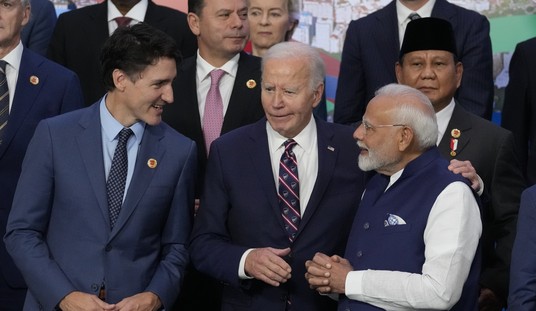The New York Post published the op-ed piece that the New York Times rejected from John McCain, as debate continues over the decision to spike it. The piece itself appears to have much the same approach as Barack Obama’s earlier op-ed; in fact, it goes into greater detail than Obama’s while specifically rebutting Obama’s earlier argument:
In a New York Times op-ed and a speech last week he offered his “plan for Iraq” (in advance of his first “fact-finding” trip to Iraq in more than three years): It consisted of the same old proposal to pull all of our troops out within 16 months.
In 2007, he wanted to withdraw because he thought the war was lost. If we’d taken his advice, the war would have been lost. Now he wants to withdraw because he thinks Iraqis no longer need our assistance.
To make this point, he mangles the evidence. He makes it sound as if Maliki has endorsed his timetable – when the Iraqi prime minister has merely said that he’d like a plan for the eventual withdrawal of US troops at some unspecified future point.
Sen. Obama is also misleading on the readiness of the Iraqi military. Iraq’s army will be equipped and trained by the middle of next year – but that doesn’t mean, as Sen. Obama suggests, that it’ll then be ready to secure the country without a good deal of help.
The Iraqi air force, for one, still lags behind, and no modern army can operate without air cover. The Iraqis are also still learning how to conduct planning, logistics, command and control, communications and other complex functions needed to support frontline troops.
Of course, the Times can choose to publish whatever it wants. If it doesn’t want to publish McCain, then that’s their choice — but if they want to have a pretense of objectivity, they’re going to have to explain why Obama got published and McCain did not better than David Shipley did. Shipley’s justification makes it sound as though they rejected McCain because of his policy, and not because of any defect in wordsmithing:
In an e-mail to the campaign on Friday, David Shipley, an op-ed editor at the newspaper, said he could not accept the piece in its current form, but would look at another version. In the e-mail, released by the McCain campaign, Shipley wrote that McCain’s article would “have to lay out a clear plan for achieving victory — with troops levels, timetables and measures for compelling the Iraqis to cooperate. And it would need to describe the senator’s Afghanistan strategy, spelling out how it meshes with his Iraq plan.”
In other words, McCain would have to adopt Obama’s policy of timetables and “pressure”, rather than focusing on cooperation and conditions on the ground. That goes beyond normal editorial control to dictating content and policy to McCain as a prerequisite for publication. No legitimate columnist would agree to work under those terms, and few editors would make the mistake of attempting to impose those kinds of requirements.
Furthermore, the essay in fact did give an estimate of when most troops would be out of Iraq:
As we draw down in Iraq, we can beef up our presence on other battlefields (such as Afghanistan) without fear of leaving a failed state behind. I’ve said that I expect to welcome home most of our troops from Iraq by the end of my first term in office, in 2013.
But I’ve also said that any draw-downs must be based on a realistic assessment of conditions on the ground – not on an artificial timetable crafted for domestic political reasons. This is the crux of my disagreement with Sen. Obama.
Why wasn’t that sufficient for Shipley? Obama’s essay offered this:
As I’ve said many times, we must be as careful getting out of Iraq as we were careless getting in. We can safely redeploy our combat brigades at a pace that would remove them in 16 months. That would be the summer of 2010 — two years from now, and more than seven years after the war began. After this redeployment, a residual force in Iraq would perform limited missions: going after any remnants of Al Qaeda in Mesopotamia, protecting American service members and, so long as the Iraqis make political progress, training Iraqi security forces. That would not be a precipitous withdrawal.
As McCain wrote, that indeed is the crux of the disagreement, which Shipley either fails to understand or simply doesn’t want to publish.
Bill Richardson thinks McCain should stop “whining”:
New Mexico Gov. Bill Richardson (D) said Sen. John McCain (R-Ariz.) is “overreacting” and “whining” in response to The New York Times refusing to run his editorial about Iraq.
Richardson, who supports Sen. Barack Obama (D-Ill.) for president, said in an interview on Fox News on Tuesday that the rejection of McCain’s editorial is not surprising because The New York Times turns down many editorials from politicians, including presidential candidates.
John Bolton, on the other hand, says that the argument Shipley makes “boggles the mind”:
As a writer who has received scores of rejection letters myself, I understand that most submissions to print media never see the light of day. That’s one reason the blogosphere exists. I’d disagree with Bolton on that point; freedom of expression does not include the right to have one’s words published in a newspaper. Shipley and the Times should not be forced (by the government) into printing something they do not want, and neither should anyone else.
However, if they offer the lame excuses Shipley does in this case for not publishing McCain’s piece, then their readers can reasonably conclude that they have no objectivity in this election and have decided to become a campaign mouthpiece for Barack Obama. Pointing out the biased treatment given on this point does not constitute “whining”, as Richardson puts it, but a fair criticism of the Times’ editorial decision.








Join the conversation as a VIP Member